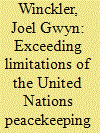| Srl | Item |
| 1 |
ID:
137133


|
|
|
|
|
| Summary/Abstract |
United Nations peacekeeping is implemented by a complex bureaucratic organization, which itself can be a source of dysfunction and failure. This article empirically explores the strategies officials within the United Nations Mission in Liberia and the Department of Peacekeeping Operations apply in order to continue to do their job as effectively as possible despite the limitations of the UN peacekeeping bureaucracy. The findings demonstrate that internal acknowledgement and relevance of work are core strategic goals of UN officials. However, as the actual practices of achieving these objectives vary at different levels and locations of the UN peacekeeping bureaucracy, these strategies contribute to a significant diversity of local and decentralized decision-making frameworks rather than a rationalized effective bureaucracy.
|
|
|
|
|
|
|
|
|
|
|
|
|
|
|
|
| 2 |
ID:
137787


|
|
|
|
|
| Summary/Abstract |
One of the goals of peacekeeping operations is limiting the amount of violence that takes place during a civil war. However, peacekeeping forces cannot occupy every part of a country that is engulfed in a civil conflict. This raises the question as to where peacekeeping forces decide to go once they are deployed to a civil war-torn country. In this article, we contribute to the burgeoning research that examines peacekeeping at the microlevel by attempting to determine whether peacekeeping operations go to those areas that are in most need of their help. Utilizing geocoded data from the UCDP GED and PKOLED projects, we use spatial analysis techniques to create kernel density estimates of civil war violence and peacekeeping operations at site-specific locations. We then use these newly generated variables in a variety of regression models to determine whether the location of civil war battles influences the location of peacekeepers. The analysis confirms our expectations in that the location of violence significantly predicts the location of peacekeeping operations, but only after these operations have been in a civil war-torn country for a considerable length of time. Contrary to our expectations, however, peacekeeping operations do not seem more adept at identifying and responding to government and rebel violence relative to attacks against civilians
|
|
|
|
|
|
|
|
|
|
|
|
|
|
|
|
| 3 |
ID:
137788


|
|
|
|
|
| Summary/Abstract |
A rich literature has developed focusing on the efficacy of peacekeeping operations (PKOs) in a temporal sense—asking whether the periods following a deployment are more peaceful or not. We know less about the efficacy of PKOs in a spatial sense. Can peacekeeping shape the geographic dispersion of particular episodes of violence? We posit that PKOs can contain conflict by decreasing the tactical advantage of mobility for the rebels, by obstructing the movement of armed actors, and by altering the ability for governments to seek and confront rebel actors. We investigate the observable implications using georeferenced conflict polygons from the Uppsala Conflict Data Program's (UCDP) Georeferenced Event Dataset (GED). Our findings confirm that PKOs tend to decrease movement in the conflict polygons, especially when robust forces are deployed and when rebel groups have strong ethnic ties. Our findings, on the one hand, imply that PKOs reduce the geographic scope of violence. On the other hand, PKOs may allow nonstate actors to gain strength and legitimacy and thus constitute an even greater future threat to the state whether some form of accord is not reached.
|
|
|
|
|
|
|
|
|
|
|
|
|
|
|
|